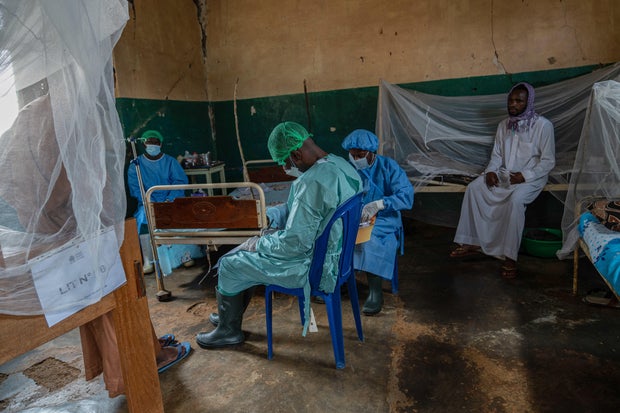U.S. boosts passenger screening as Marburg and mpox viruses spread

Gottlieb: Americans “not at risk right now” for mpox variant
Johannesburg — After the world was caught largely unprepared for the COVID-19 pandemic, scientists warned that lessons must be learned. Now, two more viral outbreaks are giving health officials sleepless nights.
Rwanda is still grappling with its first outbreak of Marburg virus. A cousin to the Ebola virus, Marburg is one of the deadliest viruses known to science, with a fatality rate of about 88%. According to Rwandan Health Minister Dr. Sabin Nsanzimana, there have been 62 cases of Marburg confirmed in Rwanda, with 38 recoveries and 15 deaths.
“Nine people remain in treatment, with most of them improving,” Nsanzimana said during a virtual media briefing on Thursday.
The outbreak was declared on Sept. 27, after health officials realized the treatment they were administering to people with suspected malaria cases wasn’t working. By then, some health officials had been infected, Nsanzimana said.
Nsanzimana said Thursday that Rwanda’s Marburg response had improved.
“We are seeing a positive trend. This is the 3rd week new infections have reduced by more than 50% compared to the first two weeks, and in consecutive days this week we have had no new detections,” he said, adding: “In the past seven days, people recovering from treatment centers are now outnumbering people who die from the virus.”
There are currently no licensed vaccines or treatments for Marburg, but several vaccines are in early-stage clinical trials. The Washington D.C.-based, non-profit Sabin Vaccine Institute has delivered 1,800 doses of its single-dose clinical trial vaccine to Rwanda.
To date, 856 people in high-risk groups, including close contacts of known cases and health care workers, have been given one of those doses.
U.S. enhanced screening measures take effect
Under new measures announced last week, all travelers due to arrive in the U.S. from Oct. 15 onward, within 21 days of being in Rwanda, must ensure they fly directly into New York’s John F. Kennedy, Chicago O’Hare or Washington-Dulles International airports for immediate enhanced health screening.
“The risk of Marburg in the U.S. remains low, however, these measures are being taken out of an abundance of caution given the ongoing outbreak in Rwanda,” CDC spokesperson David Daigle said as the measures were announced on Oct. 7.
Passengers with recent travel history to Rwanda will have their temperatures checked upon arrival at one of the three designated U.S. airports and should expect to answer questions about symptoms and potential exposure to the virus in areas set aside for the screenings.
The CDC said passengers who clear the checks but then experience fever, chills, headaches or other symptoms commonly associated with the disease should immediately isolate themselves from others and seek medical attention, ideally advising the health care facility in advance of their circumstances.
The Rwandan Health Minister said teams were working to trace the routes of infection in the country and that health workers had implemented “testing for all travelers both at Kigali International Airport and all land borders to make sure we protect everyone in Rwanda and beyond, as this virus has to be contained quickly to avoid going out of control.”
Marburg Hemorrhagic Fever is spread through contact with body fluids — saliva, semen, urine and sweat. The fact that it requires that close proximity to spread does make it easier to contain once detected. The virus is not airborne. Initially, it presents like many other viruses, with common symptoms including headache and fever. If untreated, that can turn into nausea, diarrhea and bleeding from their gums, nose and other orifices.
The Marburg and Ebola viruses are typically found in fruit bats. They can be passed on to humans by a bite, or by people eating infected bats.
Nsanzimana said once Rwanda had cleared its current cases and seen no deaths for several days, it would be able to take a step back and help with research to avoid future outbreaks.
“We won’t drop our weapons as this is an alert,” he said. “What happened with Marburg in Rwanda, can happen anytime to anywhere in the world.”
Why deadly outbreaks are becoming more common
CBS News traveled with researchers in the eastern Democratic Republic of Congo just before the COVID outbreak, and the scientists said deforestation and climate change were increasing the amount of human-to-animal contact, which was in turn increasing the number of deadly virus outbreaks in human populations.
Marburg and Ebola used to pop up rarely, with outbreaks occurring about once per decade. Last year alone, Equatorial Guinea and Tanzania both dealt with Marburg outbreaks, as well as Ghana in 2022.
A Marburg outbreak can be declared over if there are no new cases reported for a period of at least 21 days — the incubation period of the virus, according to Africa CDC Director General Dr. Jean Kaseya.
In addition to the vaccines undergoing trials, Rwandan doctors have also been testing the antiviral drug Remdesivir, to see if it works as a treatment for Marburg.
Mpox continues spreading in Africa
While Marburg is certainly the most concerning virus facing African health officials at the moment, another disease has continued spreading quietly on the continent.
Over the past week, both Zambia and Zimbabwe reported their first cases of the mpox virus, previously known as monkeypox.
The World Health Organization declared mpox a global public health emergency in August for the second time in two years.
Health officials in the 17 countries where cases had already been confirmed are increasingly concerned about a new variant called Clade 1b, which is believed to spread more easily through close personal contact than previous strains.
“Mpox is going out of control,” Kaseya of the Africa CDC warned Thursday. “If we don’t act, a lot more than the current 1,100 people who have died, will be dead.”
So far, more than 900 African people, mainly children, have died of mpox this year, with the Democratic Republic of Congo being the current epicenter of the outbreak. Mpox has plagued Congo and its neighboring countries for several decades, but Kaseye said the overall caseload was up 380% compared to 2023, “which is huge.”
Scientists say the precipitous rise in cases is due largely to the new variant. That strain has not yet appeared in the U.S., but experts say it’s likely just a matter of time.

Kaseya said the Africa CDC needed roughly 10 million doses and $600 million to contain the outbreak, but African officials say a surge in the price of mpox vaccine and hoarding by rich, developed nations has delayed the response and allowed the virus to spread.
“We are still talking about pledges made [by the international community], and we hope to finalize pledges into concrete money, tools and vaccines for our countries,” Kaseya said during the briefing with Nsanzimana and other officials.
Health officials in Congo also delayed asking for help as the vaccine had not undergone African trials or been endorsed, at the time, by the WHO.
Kaseya said there were 42,238 reported mpox cases across the continent, 8,113 of which had been confirmed. Over the last week alone, 50 deaths and 3,051 new cases were reported.
Mpox is related to smallpox, and long-approved smallpox vaccines could have provided some protection to children, had their administration not been halted after the WHO deemed the disease to no longer pose a public health threat in the late 1970s.
DR Congo and other countries stopped administering the vaccines early in the following decade. Scientists believe the lack of built up immunity is one of the main reasons the current outbreak is hitting children so hard, with the most cases and the highest numbers of deaths.
With Zambia and Zimbabwe reporting their first cases in recent days, 18 countries now have mpox outbreaks.
Uganda reported two new cases, meanwhile, in a prison where staff initially thought inmates had chicken pox, until tests confirmed it was mpox. That has made all 1,874 inmates at the facility possible close contacts.
“Prisons, and IDP [internally displaced people] camps in eastern DRC, present a major challenge”, said Kaseya, warning that “countries need a vaccination plan immediately.”
DR Congo and Rwanda have already begun administering vaccines, and Nigeria plans to start on October 22.
“We don’t want to see all African countries being affected,” said Kaseya, calling on the world to “intensify its efforts.”
- In:
- Democratic Republic of Congo
- Marburg Virus
- Centers for Disease Control and Prevention
- Africa
- Mpox
- Rwanda








